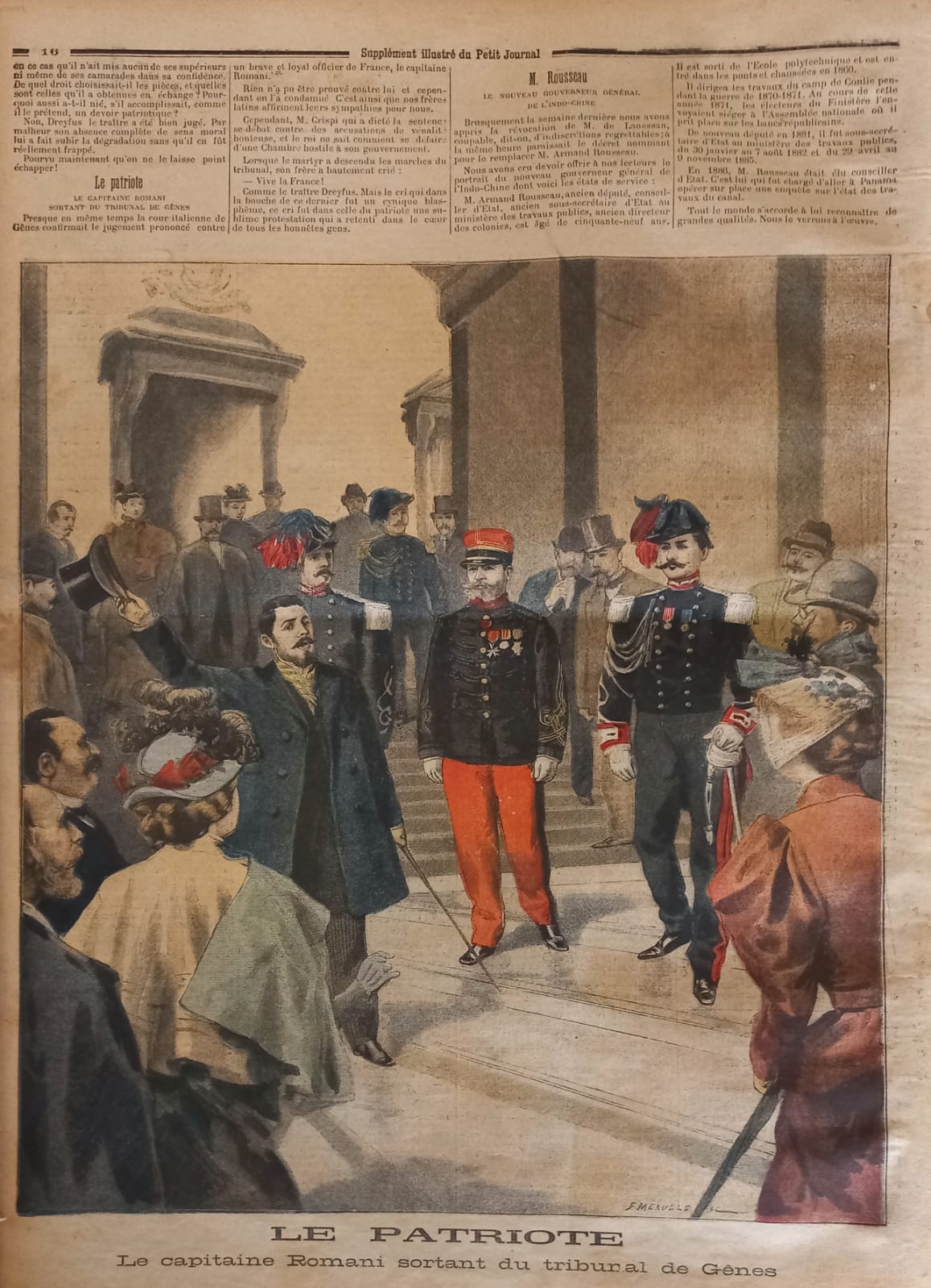Posthumous Promotion For Alfred Dreyfus? French Lawmakers Debate Symbolic Act

Table of Contents
The Case for Posthumous Promotion
The proposal for a posthumous promotion for Captain Alfred Dreyfus is not merely a bureaucratic act; it's a powerful statement about justice, memory, and national reconciliation.
Redressing a Historical Injustice
The Dreyfus Affair stands as a stark example of a wrongful conviction fueled by rampant antisemitism. Alfred Dreyfus, a Jewish officer in the French army, was falsely accused of treason, a charge based on fabricated evidence and fueled by virulent prejudice. His subsequent degradation, imprisonment on Devil's Island, and years of suffering represent a profound injustice that continues to resonate.
- Wrongful Conviction: The Dreyfus Affair highlights the dangers of unchecked prejudice within institutions.
- Antisemitism: The affair exposed the deep-seated antisemitism prevalent in French society at the time.
- Symbolic Gesture: A posthumous promotion would serve as a powerful symbolic gesture, officially acknowledging the horrific miscarriage of justice.
- Rehabilitation: It would represent a formal rehabilitation of Dreyfus's name and legacy, restoring his honor after decades of undeserved disgrace.
The weight of this historical injustice demands redress. A posthumous promotion offers a crucial opportunity to confront France's past and acknowledge the damage inflicted by antisemitism.
National Reconciliation and Healing
Beyond individual justice, a posthumous promotion for Alfred Dreyfus could contribute significantly to national reconciliation and healing. By officially recognizing the injustice, France would take a crucial step towards confronting its past and acknowledging its mistakes. This symbolic act could hold profound educational value, reminding future generations of the importance of fighting prejudice and upholding justice.
- National Reconciliation: A symbolic gesture can foster unity and healing in a nation grappling with its history.
- Historical Memory: Recognizing the Dreyfus Affair is essential for fostering a healthy national memory and promoting understanding.
- Public Apology: The promotion can be interpreted as a formal public apology for the state’s role in the injustice.
- National Identity: Acknowledging past wrongs strengthens national identity by demonstrating a commitment to justice and equality.
Arguments Against Posthumous Promotion
While the moral imperative for redressing the Dreyfus Affair is strong, arguments against a posthumous promotion also merit consideration.
Concerns About Setting Precedents
One major concern centers around the potential for setting a legal precedent. If Dreyfus receives a posthumous promotion, it could open the floodgates to similar requests for individuals wrongly convicted throughout history. This raises concerns about fairness and consistency in applying such a measure. Establishing clear and objective criteria for posthumous promotions would be a significant challenge.
- Legal Precedent: The decision could set a precedent for future cases, impacting legal processes and resource allocation.
- Fairness and Consistency: Creating a fair and consistent system for posthumous promotions would be exceptionally difficult.
- Criteria for Promotion: Defining objective criteria for posthumous military promotions would be a complex and potentially contentious undertaking.
- Due Process: Critics may argue that posthumous promotions circumvent the usual process of military advancement and due process.
Focus on Broader Issues of Antisemitism
Some argue that while a posthumous promotion is a meaningful symbolic act, it might inadvertently overshadow the broader and more pressing issue of contemporary antisemitism. Focusing solely on a historical event risks neglecting the ongoing struggle against prejudice and discrimination. The fight against antisemitism requires sustained efforts beyond symbolic gestures.
- Contemporary Antisemitism: Addressing modern forms of antisemitism should remain a priority.
- Combating Prejudice: Resources should be allocated to combatting present-day prejudice rather than solely focusing on historical events.
- Ongoing Struggle: The fight against antisemitism is an ongoing struggle requiring sustained commitment.
- Systemic Racism: The Dreyfus Affair highlights systemic issues of racism and bias that persist to this day.
Conclusion
The debate surrounding a Posthumous Promotion for Alfred Dreyfus is complex and multifaceted. While proponents emphasize the importance of redressing a historical injustice and fostering national reconciliation, opponents express concerns about setting legal precedents and potentially overshadowing the continuing struggle against antisemitism. The Dreyfus Affair remains a powerful reminder of the dangers of unchecked prejudice and the enduring need for justice. Its legacy continues to shape discussions about historical memory, national identity, and the fight against antisemitism. What is your opinion on the symbolic importance of a posthumous promotion for Alfred Dreyfus, and what message would it send to France and the world? Share your thoughts in the comments below.

Featured Posts
-
 Artfae Daks Alalmany Mwshr Ela Teafy Alaqtsad Alawrwby
May 25, 2025
Artfae Daks Alalmany Mwshr Ela Teafy Alaqtsad Alawrwby
May 25, 2025 -
 Frankfurt Stock Market Closes Lower Dax Below 24 000 Points
May 25, 2025
Frankfurt Stock Market Closes Lower Dax Below 24 000 Points
May 25, 2025 -
 Glastonbury 2025 Is This The Strongest Lineup Ever Featuring Charli Xcx And Neil Young
May 25, 2025
Glastonbury 2025 Is This The Strongest Lineup Ever Featuring Charli Xcx And Neil Young
May 25, 2025 -
 Walker Peters To Leeds Latest Transfer News And Updates
May 25, 2025
Walker Peters To Leeds Latest Transfer News And Updates
May 25, 2025 -
 Net Asset Value Nav Explained Amundi Msci World Ex Us Ucits Etf Accumulation
May 25, 2025
Net Asset Value Nav Explained Amundi Msci World Ex Us Ucits Etf Accumulation
May 25, 2025
Latest Posts
-
 Michael Caine Recalls Awkward Mia Farrow Sex Scene Encounter
May 25, 2025
Michael Caine Recalls Awkward Mia Farrow Sex Scene Encounter
May 25, 2025 -
 Mia Farrows Stark Warning The Future Of American Democracy In Jeopardy
May 25, 2025
Mia Farrows Stark Warning The Future Of American Democracy In Jeopardy
May 25, 2025 -
 Past Florida Film Festivals Notable Celebrity Appearances Mia Farrow Christina Ricci
May 25, 2025
Past Florida Film Festivals Notable Celebrity Appearances Mia Farrow Christina Ricci
May 25, 2025 -
 Analysis Mia Farrows Comments On Trump And The State Of American Democracy
May 25, 2025
Analysis Mia Farrows Comments On Trump And The State Of American Democracy
May 25, 2025 -
 Celebrities At The Florida Film Festival Mia Farrow Christina Ricci And More
May 25, 2025
Celebrities At The Florida Film Festival Mia Farrow Christina Ricci And More
May 25, 2025
